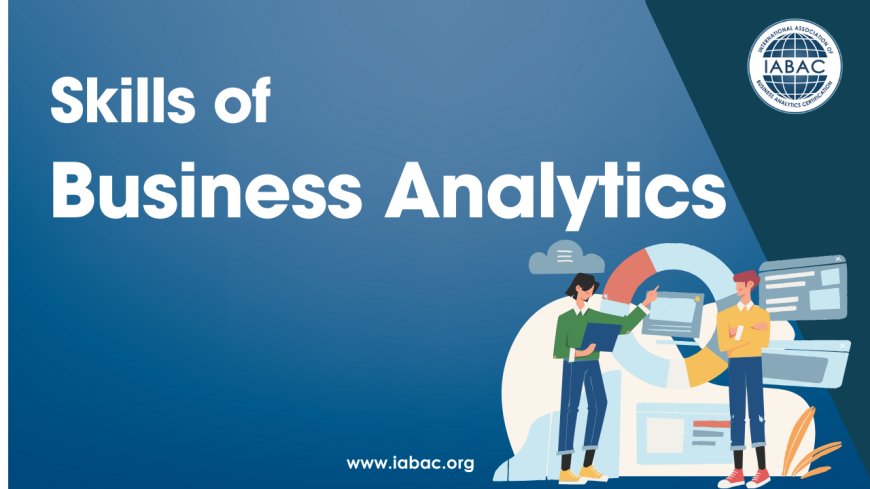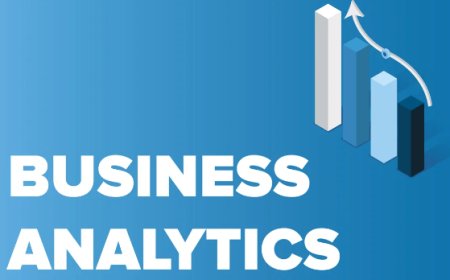Skills of Business Analytics
Master essential business analytics skills to boost growth and innovation. Learn data analysis, statistical methods, and strategic decision-making for business success.

Today, making decisions based on data is becoming more common in businesses. Companies from different industries are starting to see the value of using data to guide their decisions. This move towards data-driven strategies highlights the need for effective analysis tools and methods. By using data, companies can improve how they operate, make customers happier, and stay relevant in their markets.
Business analytics plays a crucial role in this shift. It helps turn raw data into useful insights by using techniques from statistics, data mining, and predictive analytics. These insights are important for understanding customer preferences, spotting market trends, and predicting changes. With business analytics, companies can make better decisions faster, adapt to changes, and plan for the future more effectively. As competition increases, the ability to quickly use data insights helps companies maintain their edge and continue to grow.
Talent Gap in Business Analytics Skills
Despite the increasing need for business analytics in today's market, there's a noticeable gap between the demand for skilled professionals and the supply of talent equipped with the required skills. Many companies are actively seeking experts who can analyze data and derive insights that drive decision-making and business strategies. However, finding individuals who have both the technical expertise in data analysis, statistical methods, and predictive modeling and the business acumen to apply these insights effectively remains a challenge.
This talent gap highlights the need for more specialized education and training programs that focus on both the analytical and practical applications of business analytics. As businesses continue to embrace data-driven approaches, the demand for these skills will likely grow. Training and developing current employees and encouraging the next generation of professionals to pursue careers in data science and business analytics are crucial steps to closing this gap and ensuring businesses have the capabilities to leverage data effectively.
What skills are essential for business analytics?
To excel in business analytics, a range of skills is essential for effectively turning data into actionable insights:
-
Statistical Analysis - Mastery of statistical methods is crucial for analyzing and interpreting data accurately. This includes understanding probabilities, regressions, and hypothesis testing.
-
Data Visualization - The ability to create clear visual representations of complex data sets is vital. Using tools like Tableau or Microsoft Power BI helps in making data understandable and actionable for decision-makers.
-
Programming Skills - Knowledge of programming languages such as Python and R is necessary for data manipulation, statistical analysis, and building predictive models. These skills allow for handling large datasets and performing complex calculations efficiently.
-
Problem-Solving - Analytical thinking to troubleshoot data-related issues and propose effective solutions is key. This involves understanding the root causes of business problems and crafting data-driven strategies.
-
Business Acumen - Understanding the business environment, including market conditions, financial operations, and customer needs, is essential. This knowledge allows analysts to tailor their insights to meet business objectives.
-
Communication Skills - Communicating complex data insights in a simple, clear manner to stakeholders, including those without a technical background, ensures that insights are understood and implemented.
-
Machine Learning - Familiarity with machine learning techniques is increasingly important as businesses seek predictive insights and automation. Skills in this area can lead to more advanced analyses and innovative solutions to business challenges.
Developing these skills will not only improve a business analyst's ability to interpret data but also enhance their capacity to influence business strategies and outcomes significantly.
How can individuals enhance their skills to meet industry demands?
Individuals can develop and enhance their skills in business analytics by following a few practical steps:
-
Education - Pursuing courses or degrees in relevant fields like statistics, data science, or business administration helps build foundational knowledge.
-
Practical Experience - Gain hands-on experience by working on real-world projects or internships. This can be through job roles or by participating in data challenges on platforms like Kaggle.
-
Networking - Connect with professionals in the field through industry conferences, seminars, and online forums. This helps in learning industry trends and new technologies.
-
Certifications - Pursue professional certifications in business analytics tools and techniques. Certifications from recognized bodies like SAS, Microsoft, or Google can add significant value.
-
Continuous Learning - Stay updated with the latest developments in tools, technologies, and methods in analytics by reading industry publications and attending workshops.
By focusing on these areas, individuals can build the necessary skills to meet the demands of the business analytics industry effectively.
Ethical Implications of Data Analysis
Understanding these ethical dimensions helps professionals avoid negative impacts on individuals and society, promoting trust and integrity in data-related projects. Fostering an ethical approach in data analysis is essential for maintaining public confidence and upholding high standards in data-driven decision-making.
Awareness of ethical implications in data analysis is crucial for the responsible handling and usage of data. Key aspects include:
-
Privacy Concerns - Safeguarding personal information and adhering to data protection regulations like GDPR to ensure individual privacy rights are respected.
-
Bias Mitigation - Identifying and reducing biases in data sets and algorithms to prevent unfair outcomes. This involves scrutinizing data sources, testing algorithms for fairness, and adjusting models as necessary.
-
Responsible Data Usage - Using data in ways that are ethical and transparent. This means communicating how data is collected, processed, and used, and ensuring that data practices align with both legal requirements and ethical standards.
Continuous Learning in Business Analytics
In the rapidly changing field of business analytics, a commitment to lifelong learning is essential. Staying updated with new technologies and methodologies helps professionals remain relevant and effective. Key aspects include:
1. Continuous Learning - Regularly taking courses and attending workshops to learn about the latest tools, techniques, and trends in data analysis.
2. Emerging Technologies - Keeping up with advancements in areas like artificial intelligence, machine learning, and big data analytics to enhance analytical capabilities.
3. Networking - Engaging with industry peers through conferences, seminars, and online forums to share knowledge and stay informed about industry developments.
4. Practical Application - Applying new knowledge in real-world projects to gain hands-on experience and improve problem-solving skills.
By focusing on these areas, individuals can ensure they remain adaptable and capable of leveraging data for effective decision-making in an ever-evolving business environment.
The key skills for success in business analytics include statistical analysis, data visualization, programming, problem-solving, business acumen, communication, and machine learning. It's important to keep learning and adapting as the field evolves. Staying updated with new technologies and methods helps professionals effectively use data for informed decision-making, ensuring they can meet the changing demands of the industry.











































